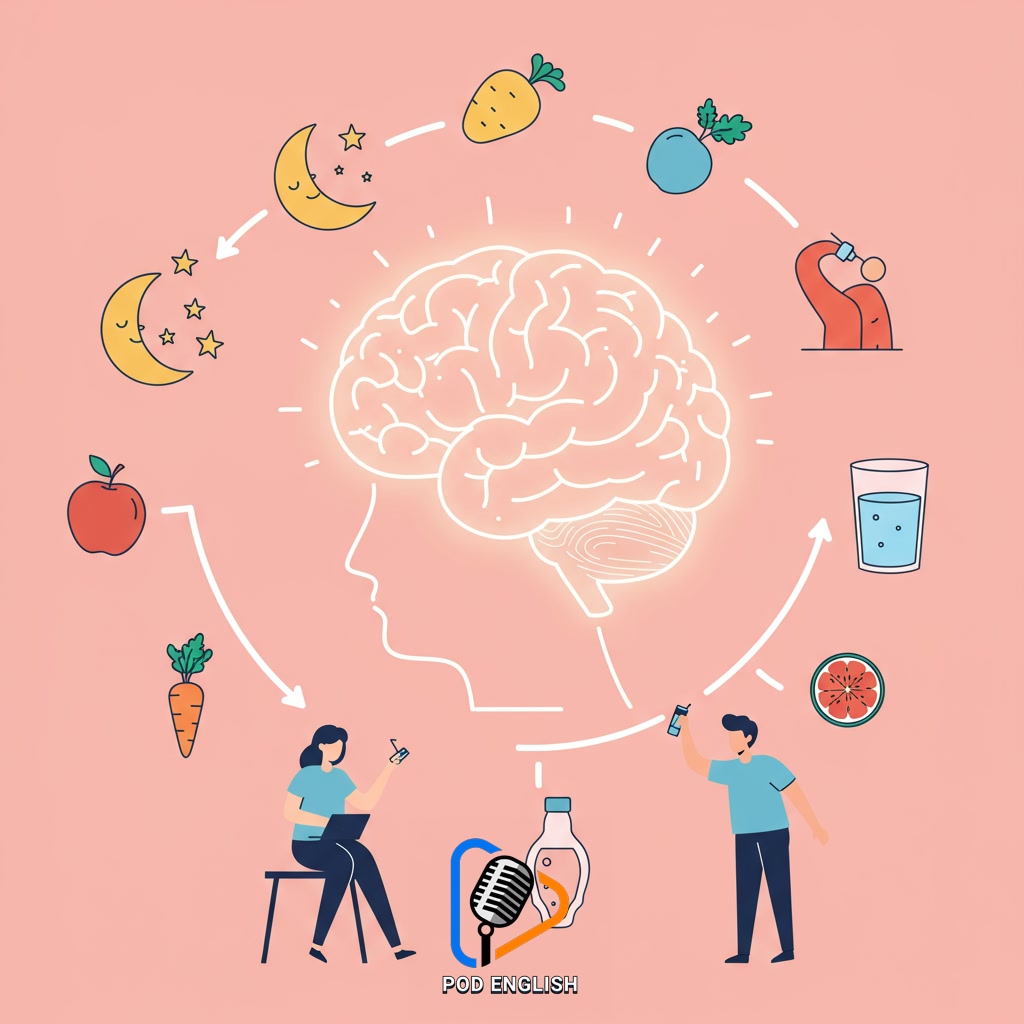Learn English
Boost Your Well-being for English Exam Success

Achieving success in English exams is closely linked to maintaining optimal well-being. This content explores strategies for improving physical and mental health to enhance the effectiveness of learning English. It provides actionable insights on how prioritizing self-care can significantly impact exam performance and overall proficiency in the language.
Table of Contents
- Section 1: The Crucial Link Between Well-being and English Exam Success
- Section 2: Physical Well-being: Fueling Your Brain for Effective Learning
- Section 3: Mental and Emotional Resilience: Managing Stress and Anxiety
- Section 4: Integrating Well-being into Your English Learning Routine
- Section 5: Well-being Strategies for Peak Performance on Exam Day
- Section 6: Sustaining Well-being for Long-Term English Proficiency
Section 1: The Crucial Link Between Well-being and English Exam Success
Achieving success in English exams isn’t solely about mastering grammar rules and vocabulary; it’s significantly influenced by your overall well-being. When you are physically rested and mentally calm, your brain is better equipped to absorb new information, retain complex concepts, and recall them under pressure. High stress levels, fatigue, and poor health can impair concentration, memory, and cognitive function, directly hindering your ability to learn English effectively and perform optimally on exam day. Therefore, recognizing and nurturing the crucial link between your physical and mental state and your academic performance is a fundamental step towards achieving your goals in English learning. Prioritizing self-care isn’t a distraction from studying, but a vital strategy that enhances your capacity for successful English exam preparation and performance.

Section 2: Physical Well-being: Fueling Your Brain for Effective Learning
To truly excel in English exams, optimizing your physical well-being is fundamental. Your brain, the primary tool for learning vocabulary, grammar, and comprehension, relies heavily on your physical state. Ensuring adequate sleep allows your brain to consolidate memories and be refreshed for new information. Proper nutrition, focusing on balanced meals rather than sugary snacks, provides the sustained energy needed for long study sessions. Staying well-hydrated is crucial for cognitive function, preventing headaches and fatigue that hinder concentration. Regular physical activity, even a short walk, boosts blood flow to the brain, enhancing alertness and reducing stress. By prioritizing these physical aspects – sleep, diet, hydration, and movement – you effectively fuel your brain, making your English learning efforts significantly more productive and sustainable during intense exam periods.

Section 3: Mental and Emotional Resilience: Managing Stress and Anxiety
Beyond physical health, cultivating mental and emotional resilience is paramount for navigating the pressures of English exams. Stress and anxiety are common during intensive study periods, potentially hindering focus, memory, and performance. Learning effective coping mechanisms is crucial. This includes techniques like mindfulness, deep breathing exercises, or short breaks to clear your head. Identifying and challenging negative thought patterns related to your abilities or the exam outcome can also significantly reduce anxiety. Building emotional resilience involves accepting challenges, maintaining a positive outlook, and knowing when to seek support from friends, family, or mentors. Prioritizing these mental strategies ensures you approach your English exams with a calm, focused, and confident mindset, allowing your hard work to translate into success.

Section 4: Integrating Well-being into Your English Learning Routine
Building on the idea that managing stress is vital, the key is to actively integrate well-being practices directly into your English learning routine, rather than seeing them as separate tasks. This means finding small, consistent ways to prioritize your mental and physical health alongside grammar drills and vocabulary lists. Consider taking short, mindful breaks every hour to stretch or simply breathe deeply before tackling a difficult reading passage. Use your English skills for relaxation, perhaps by listening to a calming English podcast or guided meditation. Schedule study sessions around physical activity or social time, ensuring you’re not sacrificing essential self-care. By making well-being an embedded part of your study process, you create a more sustainable and effective path to improving your English proficiency and performing better under exam pressure.

Section 5: Well-being Strategies for Peak Performance on Exam Day
On the actual exam day, your well-being strategies shift from routine integration to immediate application for peak performance. Prioritize getting a full night’s sleep; adequate rest is crucial for cognitive function and concentration. Start your day with a balanced breakfast to fuel your brain steadily. Before heading to the exam venue, take a few moments for deep breathing or a short mindfulness exercise to calm any pre-test jitters. Arrive early to avoid rushing, and ensure you have all necessary materials ready. During the exam, if you feel overwhelmed, briefly pause, take a deep breath, and refocus. Staying hydrated and maintaining a calm, focused mindset through these simple actions can significantly enhance your ability to recall information and perform at your best, making all your preparation efforts worthwhile.

Section 6: Sustaining Well-being for Long-Term English Proficiency
Transitioning from immediate exam readiness, maintaining your well-being becomes a cornerstone for sustained English proficiency long after the tests are over. It’s about integrating healthy habits like regular sleep, balanced nutrition, and consistent physical activity into your daily routine, not just for peak moments but for ongoing cognitive function and emotional resilience. This consistent self-care approach fuels your ability to absorb new vocabulary, understand complex grammar, and practice speaking and listening effectively over time. By prioritizing your physical and mental health continuously, you build a robust foundation that supports consistent learning, prevents burnout, and allows you to achieve true, lasting fluency in English, making the journey enjoyable and sustainable.














